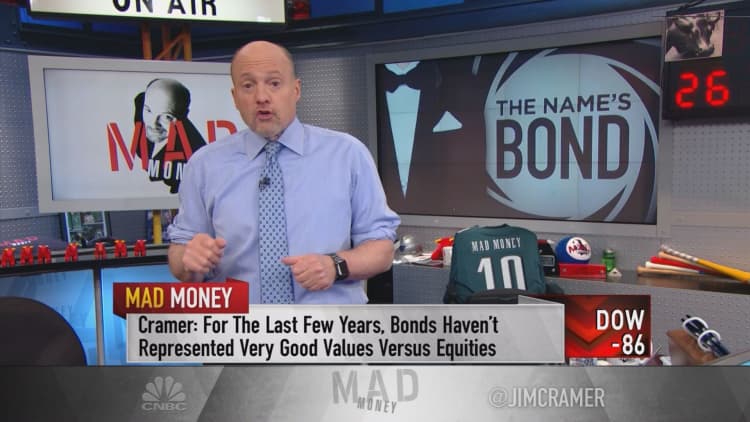
Ever since the Great Recession, interest rates have been so low that Jim Cramer hasn't been recommending that investors buy bonds. That isn't because "Mad Money" is just about stocks; it is because stocks and bonds play very different roles in a portfolio.
"In general, for the last few years, even when the stock market has been getting absolutely pounded, bonds simply haven't represented very good values versus equities," the "Mad Money" host said.
Cramer has always had the notion that excessive prudence can be one of the most reckless strategies of all. If too much money is invested in safe, risk-free U.S. Treasury bonds, that basically insures a very low return on an investment. So, for those who want to grow their capital, stocks are the only game in town.
But that doesn't mean there isn't a place for bonds in a portfolio. They play an essential role in investing, especially as investors get older.
Depending on how old you are, there is a huge difference in how you should approach the very idea of putting your money in bonds.Jim Cramer
Cramer considers stocks and bonds to be in two separate categories. Stocks are a tool to make money, and bonds are for capital preservation — for protecting money and providing a small, steady return that can offset the impact of inflation.
Read more from Mad Money with Jim Cramer
Cramer Remix: This one stat controls the Fed's hand
Cramer: Get an upper hand on the market—my 4 rules to owning stocks
Cramer's game plan: All eyes on employment, Fed could pull the trigger
"Depending on how old you are, there is a huge difference in how you should approach the very idea of putting your money in bonds," Cramer said. (Tweet This)
In Cramer's perspective, many financial experts tell their clients to own more bonds a lot earlier in their lifetime than what is really necessary. An investor likely will not get rich from owning Treasury bonds. So, for those investors under 35 who own a bunch of bonds with the idea that they will slowly make money, Cramer thinks they're being too cautious.
Even in a 401(k) and an IRA, Cramer recommends that younger investors weigh their investments very heavily toward stocks, particularly because these types of accounts will allow investors to avoid capital gains or dividend taxes. That means gains can compound tax-free year after year.
However, as investors grow older, owning Treasury bonds becomes absolutely essential because bonds are simply safer. So, once investors have used the stock market to make themselves financially independent, they should put more money into U.S. Treasuries for protection.
How much of a retirement portfolio should be kept in bonds versus stocks? Cramer broke it down by age:
- 20s: None
- 30s: 10 percent of your retirement fund; 20 percent if you are conservative
- 40s: 20 to 30 percent
- 50s: 30 to 40 percent
- 60s: 40 to 50 percent bonds
- Post-retirement: Increase bond exposure to 60 to 70 percent
"You're going to be living off your investments for the rest of your life, so some part of your portfolio should always be trying to create more wealth in case you live longer than you expect and need more money to support yourself," Cramer said.
So, for younger investors, Cramer says putting money into bonds is a "fool's game." But as one grows older, that bond exposure should grow. This will ensure the wealth generated from stocks is protected against the volatility of the stock market.
Questions for Cramer?
Call Cramer: 1-800-743-CNBC
Want to take a deep dive into Cramer's world? Hit him up!
Mad Money Twitter - Jim Cramer Twitter - Facebook - Instagram - Vine
Questions, comments, suggestions for the "Mad Money" website? madcap@cnbc.com



